12/09/2014
Antomar Araújo Ferreira e Angela Cristina dos Santos.
| Modalidade / Nível de Ensino | Componente Curricular | Tema |
|---|---|---|
| Ensino Médio | Língua Estrangeira | Produção oral |
| Ensino Fundamental Final | Língua Estrangeira | Grau de formalidade na escrita e na fala |
| Ensino Fundamental Final | Língua Estrangeira | Organização textual |
| Ensino Fundamental Final | Língua Estrangeira | Textos orais com marcas entonacionais e pronúncia |
| Ensino Médio | Língua Estrangeira | Compreensão oral |
| Ensino Médio | Língua Estrangeira | Competência pluricultural: língua como meio de acesso às manifestações culturais |
| Ensino Médio | Língua Estrangeira | Compreensão leitora |
O que o aluno poderá aprender com esta aula
Conhecer o vocabulário relativo a eleições e ao sistema eleitoral no Reino Unido.
Conhecer como funciona, basicamente, o sistema eleitoral britânico.
Comparar e contrastar o sistema eleitoral americano com o sistema eleitoral britânico.
Duração das atividades
Conhecimentos prévios trabalhados pelo professor com o aluno
Nenhum conhecimento prévio sistemático é requisito para esta aula.
Estratégias e recursos da aula
Esta aula está dividida em dois módulos. No primeiro, encontram-se atividades relacionadas às eleições no Reino Unido (veja figura 1). No segundo, encontra-se uma atividade que enfoca as similaridades e as diferenças entre os dois sistemas eleitorais - americano e britânico.
Módulo 1
ATIVIDADE 1
Figura 1 - British polling booths
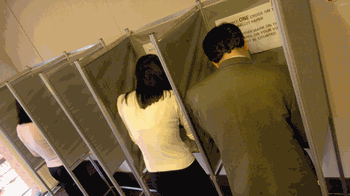
Fonte: http://www.bbc.co.uk/bitesize/standard/modern/living_democracy/images/polling_booth_512x288.gif. Acesso em 08 set 2014.
O sistema eleitoral britânico é bastante diferente do brasileiro. No Reino Unido, cujo governo é Parlamentar, o povo não elege um Presidente, como no Brasil, mas elege os membros do Parlamento. O resultado dessa eleição determinará qual partido político formará o governo. Para que os alunos entendam melhor como funciona esse sistema eleitoral, convide-os a assistirem a um vídeo, desenvolvido pelo próprio Parlamento Britânico, com objetivo didático. Este vídeo está disponível no endereço http://www.parliament.uk/education/teaching-resources-lesson-plans/general-election-60-secs/, acesso em 08 set 2014. O vídeo deverá ser exibido pelo menos três vezes, porque ele tem curta duração (1 min 21 seg) e o narrador fala rápido. A atividade proposta consiste em ordenar os eventos mostrados no vídeo. Divida a classe em grupos de 3 ou 4 alunos, faça uma cópia da figura 2 para cada time, corte-as, embaralhe-as, mas não as distribua para os grupos, neste momento. Após a exibição do filme, distribua as cartas e peça aos alunos para ordenarem os acontecimentos, na sequência em que eles aparecem no vídeo. A correção deste exercício pode ser feita oralmente, pedindo aos alunos que façam a leitura das cartas por eles ordenadas.
Figura 2 - Parts of the video.
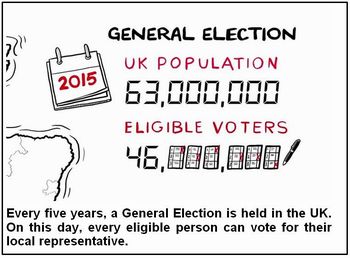
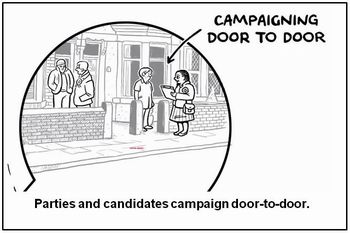
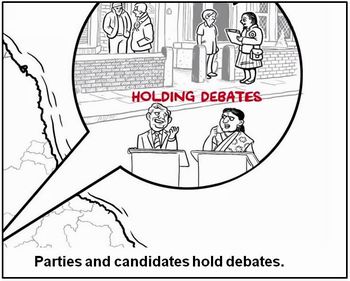
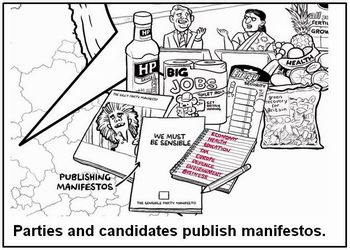
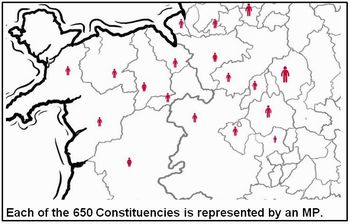
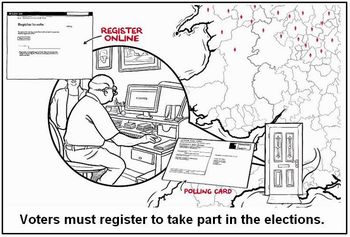
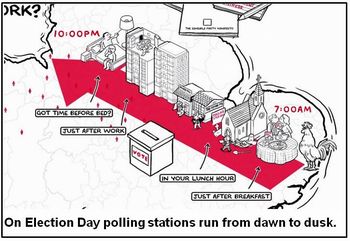
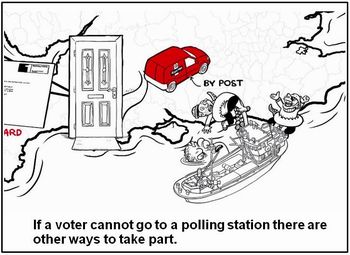
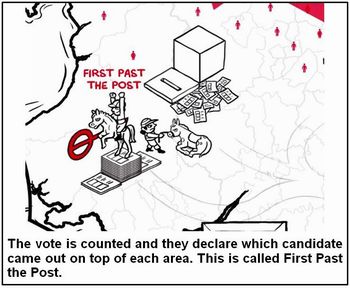
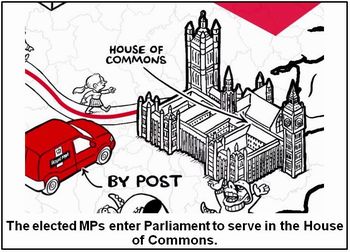
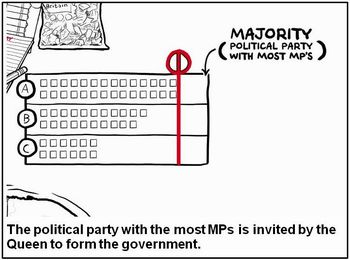
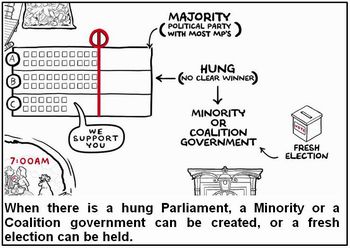
Fonte: http://www.parliament.uk/education/teaching-resources-lesson-plans/general-election-60-secs/. Acesso em 08 set 2014.
Comentário: As imagens da figura 2 foram retiradas do vídeo e as frases foram acrescentadas pela autora. Padrão de respostas esperado: A ordem das cartas segue a ordem das frases abaixo:
1. Every five years, a General Election is held in the UK. On this day, every eligible person can vote for their local representative.
2. Parties and candidates campaign door-to-door.
3. Parties and candidates hold debates.
4. Parties and candidates publish manifestos.
5. Each of the 650 Constituencies is represented by an MP.
6. Voters must register to take part in the elections.
7. On Election Day polling stations run from dawn to dusk.
8. If a voter cannot go to a polling station there are other ways to take part.
9. The vote is counted and they declare which candidate came out on top of each area. This is called First Past the Post.
10. The elected MPs enter Parliament to serve in the House of Commons.
11. The political party with the most MPs is invited by the Queen to form the government.
12. When there is a hung Parliament, a Minority or a Coalition government can be created, or a fresh election can be held.
ATIVIDADE 2
Esta atividade está relacionada ao vídeo exibido na atividade anterior. Mostre-o mais uma vez e peça aos alunos para responderem às perguntas abaixo, usando as informações contidas no vídeo.
Watch the video once more and answer the following questions:
1. What time do the polling stations open and what time do they close on the day of the election? (A que horas os lugares de votação abrem e a que horas eles fecham, no dia da eleição?)
2. How many Constituencies are there in the UK? (Quantas constituintes há no Reino Unido?)
3. Can a voter register online? (Um eleitor pode registrar-se via internet?)
4. Can a voter vote in an election by post or by proxy? (Um eleitor pode votar pelo correio ou por procuração?)
5. What is the population of the United Kingdom, approximately? (Qual é a população do Reino Unido, aproximadamente?)
6. How many eligible voters are there in the UK, approximately? (Quantos eleitores aptos a votar há no Reino Unido, aproximadamente?)
Comentário: Padrão de resposta esperado: 1. 7 a.m. and 10 p.m., respectively; 2. There are 650 Constituencies; 3. Yes; 4. Yes; 5. 63 million inhabitants; 6. 46 million voters.
Módulo 2
ATIVIDADE 1
O texto abaixo compara e contrasta as eleições gerais americanas com as britânicas. Ele foi adaptado de um texto que se encontra no endereço http://www.historylearningsite.co.uk/american_v_british_elections.htm (acesso em 08 set 2014). Faça cópias do texto e do exercício anexo para os alunos. Esta é uma atividade de compreensão leitora, cujo objetivo consiste em ler o texto silenciosamente, em seguida analisar as frases subsequentes, escrevendo US para as sentenças referentes às eleições nos Estados Unidos e UK para as frases relativas às eleições no Reino Unido.
There are many obvious differences between the national/general elections held in both America and Britain but there are also some major similarities.
1) A British Prime Minister can call an election at any time in his 5-year term. In theory, he can use good economic news, for example, to boost his party’s representation in Parliament by calling a snap general election hoping that voters will be swept along by such good news. It is said that Harold Wilson, the Labour Prime Minister in the 1960’s-1970’s used this feel good factor after England won the World Cup in 1966. The US President has no such flexibility. The date of each US national election is set in stone and the President goes into it on the back of whatever news is around at the time – be it good or bad. He cannot call an election – as it has to take place in the first week of November.
2) The US has an election every 4 years – the UK every 5 years maximum.
3) The UK’s Prime Minister can serve any number of years. The US President is limited via the Constitution to two four-year terms – a maximum of 8 years. Though the Constitution can be amended, there has been no evidence in recent years that there will be any such change to this part of the Constitution.
4) Even if the two countries populations are made into a comparable proportion, the amount of money spent during an American national election dwarfs the money spent during a UK general election. For the UK 2001 general election, political pundits spoke in terms of tens of millions being spent in total by all parties. In the 2004 American election, pundits spoke in terms of hundreds of million of dollars being spent – possibly even a billion dollars.
5) One of the main reasons for the above is the difference in duration of the two campaigns. In the UK, Tony Blair announced the 2005 general election for May 5th on April 5th – leaving just one month for campaigning. In America, the election campaign starts in January in the year of the election with primaries and caucuses, leaving 10 months until the actual election.
6) In America, the national election is between two candidates – a Republican one and a Democrat one. (Other candidates do stand but they have no chance of being elected) Voters vote for a candidate. In the UK there is a totally different approach. There is a vote for all 646 constituencies (2005 figure) and voters will probably vote for a party rather than for a candidate.
7) In America, the opportunity for a protest vote barely exists – unless you deliberately abstain. The Reform Party and Green Party do exist but the Electoral College system means that they have no chance of getting any form of power. In the UK, there are plenty of opportunities to have a protest vote against the standing party/Prime Minister. The election of Michael Bell as an Independent anti-corruption MP in 1997 showed this. In 2001 an Independent candidate received the support of the local populace and became that constituency’s MP.
8) Turnout at both national/general elections is poor. In both 2001 (UK) and 2004 (US), 1/3rd of those who could have voted did not.
9) The UK’s electoral system is based on the first-past-the-post system. All the winning party needs is a majority of MP’s elected to Westminster to win a general election. In America, some say that there are 50 elections as opposed to just one. Whoever wins a state, gets all of that state’s Electoral College votes and the loser gets none. Once a presidential candidate gets a majority of Electoral College votes, he is declared the winner even if some states have yet to declare.
10) In the UK an election manifesto is traditionally considered to be binding. It is not uncommon during Commons Question Time for Opposition MP’s to state: “In your manifesto you said… why hasn't this happened?” In America, an election platform (the equivalent of a manifesto) is not considered to be binding. It is what would be done given the perfect opportunity to do so.
Comentário: Binding = an obligation that can not be broken.
Write US for the sentences related to the elections in the United States and UK for the sentences concerning the elections in UK.
1. ____ The electoral system is based on the first-past-the-post system.
2. ____ A general election can be held at any time within a 5-year term.
3. ____ Na election platform is not considered to be binding.
4. ____ The head of government can serve a maximum of 8 years.
5. ____ The campaigns last shorter.
6. ____ A general election is held every 4 years.
7. ____ The amount of money spent on a general election is around tens of millions dollars.
8. ____ When a political party gets a majority of MP’s elected, it wins a general election.
9. ____ The campaigns last longer.
10. ____ Only two parties have chances of being elected.
11. ____ The head of the government can serve any number of years.
12. ____ A general election happens in the first week of November.
13. ____ When a candidate gets a majority of Electoral College votes, he is declared the winner.
14. ____ The amount of money spent on a general election is around a billion dollars.
15. ____ An election manifesto is traditionally considered to be binding.
Comentário: Padrão de resposta esperado: 1. UK; 2. UK; 3. US; 4. US; 5. UK; 6. US; 7. UK; 8. UK; 9. US; 10. US; 11. UK; 12. US; 13. US; 14. US; 15. UK.
Recursos Complementares
O endereço http://www.parliament.uk/education/teaching-resources-lesson-plans/the-general-election-explained/ (acesso em 08 set 2014) traz um vídeo explicando como funcionam as eleições gerais no Reino Unido.
Avaliação
A avaliação deve ser feita ao longo da aula, levando em conta o envolvimento e desempenho dos alunos nas atividades individuais e em grupo. A atividade 2 do primeiro módulo pode ser objeto de uma avaliação escrita.
Sem estrelas 0 classificações
- Cinco estrelas 0/0 - 0%
- Quatro estrelas 0/0 - 0%
- Três estrelas 0/0 - 0%
- Duas estrelas 0/0 - 0%
- Uma estrela 0/0 - 0%
Denuncie opiniões ou materiais indevidos!
- Sugestão de aula
- Aulas
- Coleções de aulas
- Criar aula
- Criar individual
- Criar em equipe
- Gerenciar equipes
- Minhas aulas
- Orientações
- Criando equipes
- Dicas para a produção de aulas
- Reflexões pedagógicas
- Utilizando a ferramenta
- Artigo: portal educacional
- Estatísticas de uso do Portal
- Estatísticas de aulas
- Estatísticas de recursos
- Estatísticas de visitas
- Recursos utilizados em aulas
- Reflexões pedagógicas
- Informações de cursos
- Cursos
- e-Proinfo
- Materiais de cursos
- Materiais de estudo
- Artigos e publicações
- Assuntos relevantes
- Avaliações
- Ciência do cotidiano
- Destaques internacionais
- Dicas práticas
- Educação profissional e tecnológica
- Entrevistas
- Estratégias pedagógicas
- Inovações tecnológicas
- Materiais de cursos
- Materiais de evento
- Orientações e diretrizes
- Parâmetros e referencias
- Programas em vídeos
- Tutoriais
- TVescola
- Ferramentas do portal
- Fórum
- Portal do Youtube
- Compartilhando apresentação
- Ferramentas pela internet
- Blog
- Compartilhe vídeos
- Comunicação on-line
- Crie e compartilhe apresentações
- Edite e compartilhe fotos
- Escrita colaborativa
- Junte-se a uma comunicade
- Lista de discussão
- Organize e compartilhe favoritos
- Podcast
- Rádio/TVs Universitárias e outros
- Redes Sociais
- Robô Ed
PLATAFORMA FREIRE
- Bibliotecas
- Capacitação Proinfo Integrado
- Cultura
- Dicionários, tradutores e enciclopédias
- Educação inclusiva
- Geoprocessamentos
- Inclusão digital
- Infográficos
- Jogos educativos
- Jornais
- Museus
- Observatórios e planetários
- Organizações governamentais
- Plataformas educacionais
- Portais educacionais e outros
- Portal MEC
- Prêmio professores do Brasil
- Produções de professores
- Projetos de escolas
- Projetos inovadores
- Projetos sociais e educacionais
- Rádio escola
- Recursos digitais
- Revistas
- Sites de busca
- Sites temáticos do portal e TVescola
- Softwares de edição e outros
- Softwares educacionais
- Um computador por aluno

- Ryan Oksenhorn
- Ryan Snow
- Sergio Caldara
- Shane Miler
- Shane Herzog
- Sotirios Papavasilopoulos
- Stephen JB Thomas
- Tarah
- Valera Nazarov
- ZbigniewMa K Flakus


